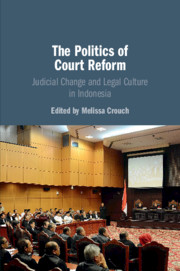Book contents
- The Politics of Court Reform
- The Politics of Court Reform
- Copyright page
- Contents
- Figures
- Tables
- Contributors
- Acknowledgements
- 1 The Judicial Reform Landscape in Indonesia
- Part I Continuity and Change in the General Court System
- 2 The Supreme Court
- 3 The District Courts
- 4 The Justice System Postman
- Part II Specialised Courts Established under the New Order
- Part III Specialised Courts as Judicial Reform Strategy
- Part IV Courts and Rights
- Epilogue
- Glossary
- Bibliography
- Index
4 - The Justice System Postman
The Indonesian Prosecution Service at Work
from Part I - Continuity and Change in the General Court System
Published online by Cambridge University Press: 30 August 2019
- The Politics of Court Reform
- The Politics of Court Reform
- Copyright page
- Contents
- Figures
- Tables
- Contributors
- Acknowledgements
- 1 The Judicial Reform Landscape in Indonesia
- Part I Continuity and Change in the General Court System
- 2 The Supreme Court
- 3 The District Courts
- 4 The Justice System Postman
- Part II Specialised Courts Established under the New Order
- Part III Specialised Courts as Judicial Reform Strategy
- Part IV Courts and Rights
- Epilogue
- Glossary
- Bibliography
- Index
Summary
The Indonesian criminal justice system finds itself under considerable pressure. Heavy caseloads and backlogs have become a central issue for the Indonesian prosecution service. Pretrial detention and prison sentences lead to overcrowding of prisons. Recent research moreover found that most of the backlog of cases in the Supreme Court are appeals of criminal cases filed by prosecutors. This makes case management highly important given that theoretically, the prosecutor’s discretion has a significant role as a criminal case filter. However, since the 1960s, when Suharto’s regimes started using the public prosecution as its instrument for political stability, public prosecutors perform as administrators rather than as officials exercising discretion with caution and care. By adopting a socio-legal approach, I explain the prosecutors’ way of thinking and their influence on how discretion is exercised. This study investigates the implications of the public prosecutions bureaucratic culture on the managing of criminal caseloads in Indonesia and demonstrates why the public prosecutor misuses the appellate procedures in the hopes of gaining success on the court. This chapter offers important insight into prosecutors as the justice system postman in Indonesia.
- Type
- Chapter
- Information
- The Politics of Court ReformJudicial Change and Legal Culture in Indonesia, pp. 86 - 106Publisher: Cambridge University PressPrint publication year: 2019
- 1
- Cited by

